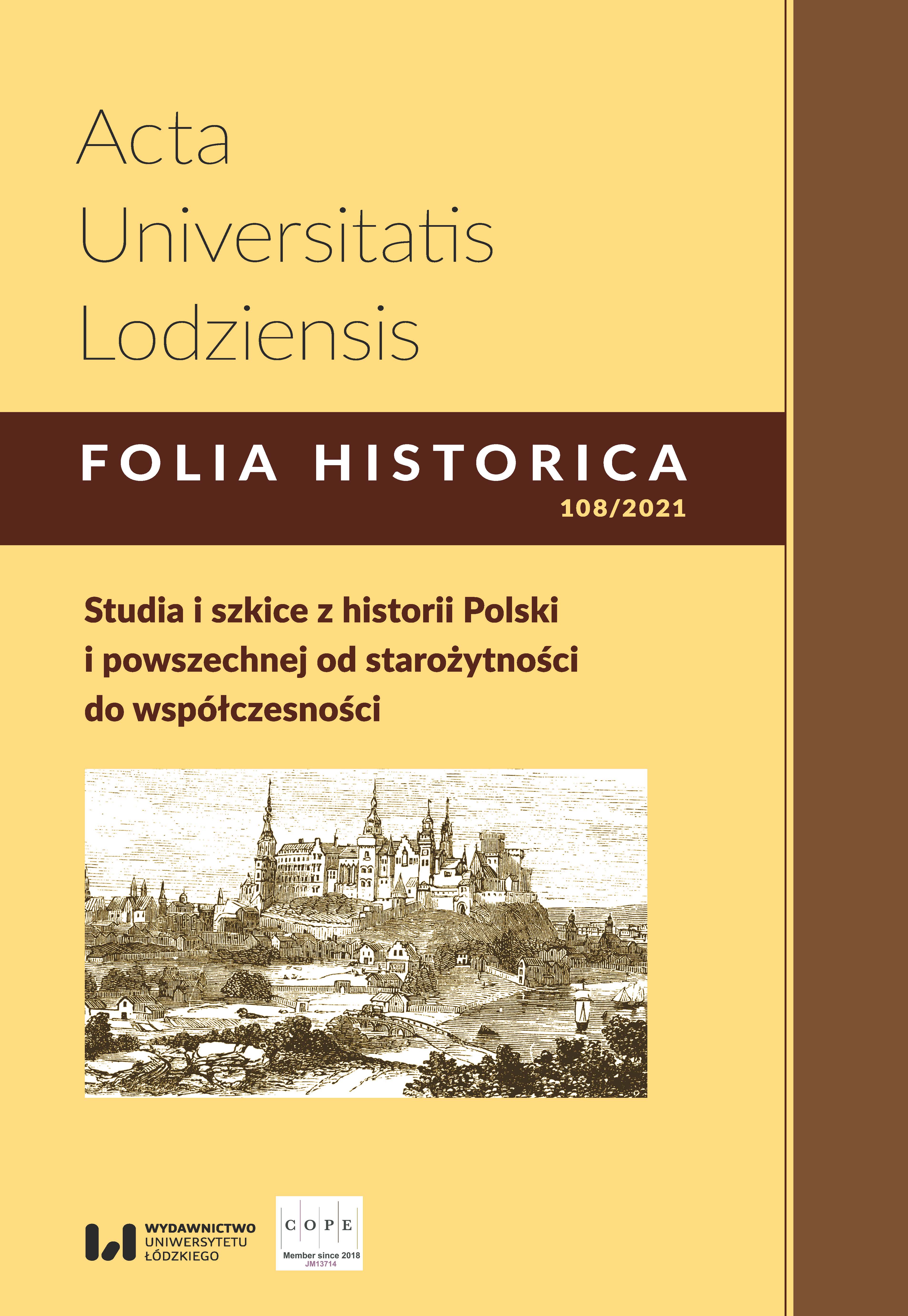Umierający Sokrates i Wielka Matka
DOI:
https://doi.org/10.18778/0208-6050.108.02Słowa kluczowe:
Sokrates, Artemida, Thargelia, mit bohaterski, nieśmiertelność, Carl Gustav Jung, Erich Neumann, Platon, Wielka MatkaAbstrakt
Ostatnie dni życia Sokratesa, które, jak wskazują na to źródła starożytne, miały miejsce na przełomie miesięcy Mounuchiōn i Thargēliōn, wpisują się w schemat sakralnego kalendarza Aten jako widowisko dopełniające rytualny cykl ofiarniczy związany z upamiętnieniem kreteńskiej wyprawy Tezeusza i obchodzonego bezpośrednio po nim święta Thargeliów. Sokrates umiera jako ofiara złożona Artemidzie – Wielkiej Matce, a jednocześnie realizuje mit bohaterski. Mit ten na płaszczyźnie jungowskiej psychoanalizy oznacza uwolnienie się świadomego ego spod władzy nieświadomości reprezentowanej przez archetyp Wielkiej Matki. Kontekst mityczno-psychologiczny pozwala nadać nową interpretację dyskusjom, które zapisał Platon w dialogach powiązanych ze śmiercią Sokratesa. Przede wszystkim w nowym świetle stawiają one Sokratejską majeutykę, jako służbę Artemidzie, a także rozważania o nieśmiertelności duszy oraz opowiadane przy ich okazji mity eschatologiczne, które zapisał Platon na kartach Fedona.
Pobrania
Bibliografia
Apulejusz z Madaury, O Bogu Sokratesa i inne pisma, przekł. K. Pawłowski, Warszawa 2002.
Google Scholar
Aristophanes, Thesmophoriazusae, [w:] Aristophanes, Aristophanes Comoediae, ed. F. W. Hall, W. M. Geldart, vol. II, Oxford 1907.
Google Scholar
Cyceron Marek Tuliusz, Rozmowy tuskulańskie, [w:] M.T. Cyceron, Pisma filozoficzne, t. III, przekł. J. Śmigaj, Warszawa 1961, s. 475–743.
Google Scholar
Diogenes Laertios, Żywoty i poglądy słynnych filozofów, przekł. I. Krońska, K. Leśniak, W. Olszewski, Warszawa 1988.
Google Scholar
Eurypides, Bachantki, [w:] Eurypides, Tragedie, t. IV, przekł. J. Łanowski, Warszawa 2007, s. 18–79.
Google Scholar
Eurypides, Hipolit, przekł. J. Kasprowicz, Warszawa 1918.
Google Scholar
Homer, Iliada, przekł. K. Jeżewska, Warszawa 1999.
Google Scholar
Ksenofont, Pisma sokratyczne, przekł. L. Joachimowicz, Warszawa 1967.
Google Scholar
Pauzaniasz, Na olimpijskiej bieżni i w boju, przekł. J. Niemirska-Pliszczyńska, Wrocław–Warszawa–Kraków 1968.
Google Scholar
Platon, Dialogi, t. I, przekł. W. Witwicki, Kęty 1999.
Google Scholar
Platon, Kratylos, przekł. Z. Brzostowska, Lublin 1990.
Google Scholar
Plutarch, Żywoty równoległe, t. I, przekł. K. Korus, Warszawa 2004.
Google Scholar
Porfiriusz, Żywot Plotyna, [w:] Plotyn, Enneady, t. I, przekł. A. Krokiewicz, Warszawa 1959, s. 3–39.
Google Scholar
Strabon, Geografia, ed. A. Meineke, Lipsk 1877, http://data.perseus.org/citations/urn:cts:greekLit:tlg0099.tlg001.perseus-grc1:4.1.4 (dostęp: 19 VII 2021).
Google Scholar
Bremmer J., Scapegoat Rituals in Ancient Greece, „Harvard Studies in Classical Philology” 1983, vol. LXXXVII, s. 299–320.
Google Scholar
DOI: https://doi.org/10.2307/311262
Buckert W., Structure and History in Greek Mythology and Ritual, Berkeley–Los Angeles–London 1979.
Google Scholar
Budin S. L., Artemis, London–New York 2016.
Google Scholar
DOI: https://doi.org/10.4324/9781315697116
Campbell J., Bohater o tysiącu twarzy, przekł. A. Jankowski, Poznań 1997.
Google Scholar
Danka I. R., Pierwotny charakter Apollina i Artemidy, Wrocław 1987.
Google Scholar
Daubner L., Attische Feste, Berlin 1932.
Google Scholar
Derrida J., Dessimination, przekł. B. Johnson, London 1981.
Google Scholar
DOI: https://doi.org/10.7208/chicago/9780226816340.001.0001
Eliade M., Sacrum, mit, historia, przekł. A. Tatarkiewicz, Warszawa 1974.
Google Scholar
Futter D., Socrates’ Bull Sacrifice, „Acta Classica” 2014, vol. LVII, s. 233–240.
Google Scholar
DOI: https://doi.org/10.15731/AClass.057.12
Girard R., Kozioł ofiarny, przekł. M. Goszczyńska, Łódź 1987.
Google Scholar
Guthrie W. K.Ch., Sokrates, przekł. K. Łapiński, S. Żurawski, Warszawa 2000.
Google Scholar
Jung C. G., Mysterium Coniunctionis. Studia o dzieleniu i łączeniu przeciwieństw psychicznych w alchemii, przekł. R. Reszke, Warszawa 2002.
Google Scholar
Jung C. G., Symbole przemiany, przekł. R. Reszke, Warszawa 1998.
Google Scholar
King H., Bound to bleed. Artemis and Greek woman, [w:] Sexuality and Gender in the Classical World: Readings and Sources, ed. L. K. McClure, Malden–Oxford 2002, s. 77–102.
Google Scholar
DOI: https://doi.org/10.1002/9780470756188.ch3
Leger R., Artemis in Attica, Utrecht 2011.
Google Scholar
Miroux G., Artémis, Artamos, Artamésis, Artamein, [w:] Les grandes figures religieuses: fonctionnement pratique et symbolique dans l’Antiquité, „Actes du Colloque international” (Besançon, 25–26 avril 1984 [Besançon] 1986, s. 127–136.
Google Scholar
Motz L., The Faces of the Goddess, New York 1997.
Google Scholar
Neumann E., The Origins and History of Consciousness, przekł. z jęz. niemieckiego R. F.C. Hull, London 1954.
Google Scholar
Osborne M. J., Entertainment in the Prytaneion at Athens, „Zeitschrift für Papyrologie und Epigraphik” 1981, Bd. XLI, s. 100–110.
Google Scholar
DOI: https://doi.org/10.1017/S0066477400004585
Roller L. W., In search of God the Mother. The Cult of Anatolian Cybele, Berkeley–Los Angeles–London 1999.
Google Scholar
Romero M. R., SJ, Without the Least Tremor: The Sacrifice of Socrates in Plato’s Phaedo, Albany, NY 2016.
Google Scholar
Sallis J., The Figure of Nature. On Greek Origins, Bloomington, Indiana 2016.
Google Scholar
DOI: https://doi.org/10.2307/j.ctt2005rzz
Sinko T., Literatura grecka, t. I, Kraków 1931.
Google Scholar
White S. A., Socrates at Colonus: A Hero for the Academy, [w:] Reason and Religion in Socratic Philosophy, eds N. D. Smith, P. B. Woodruff, Oxford 2000, s. 151–175.
Google Scholar
Pobrania
Opublikowane
Jak cytować
Numer
Dział
Licencja

Utwór dostępny jest na licencji Creative Commons Uznanie autorstwa – Użycie niekomercyjne – Bez utworów zależnych 4.0 Międzynarodowe.











